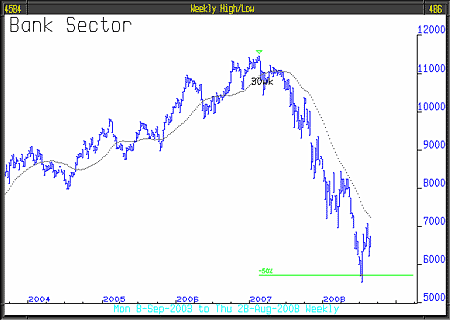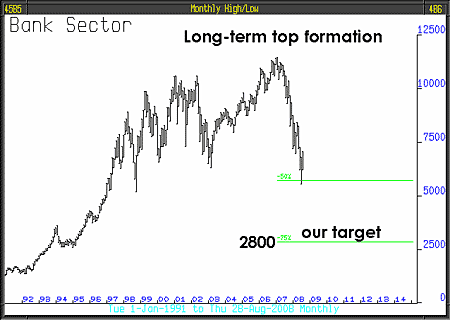Why we're only half way through the credit crisis
Born of the most cavalier lending of any time, today's banking crisis is something nobody alive today has experienced. Unfortunately, it looks like the worst is yet to come – and one of the big banks could become a casualty.
Get the latest financial news, insights and expert analysis from our award-winning MoneyWeek team, to help you understand what really matters when it comes to your finances.
You are now subscribed
Your newsletter sign-up was successful
Want to add more newsletters?

Twice daily
MoneyWeek
Get the latest financial news, insights and expert analysis from our award-winning MoneyWeek team, to help you understand what really matters when it comes to your finances.

Four times a week
Look After My Bills
Sign up to our free money-saving newsletter, filled with the latest news and expert advice to help you find the best tips and deals for managing your bills. Start saving today!
Below is the five-year weekly chart of the UK stock market bank sector, an undoubted primary bear market. The price at its recent low was 50% below last year's all-time high. If we are right about the outlook for the banking sector, then we are probably somewhere around the mid-point. In which case, there is much worse to come.

The second chart of the bank sector is a monthly chart from 3rd January 1991. We have drawn a support line at 6,300, which might have held, had the outlook been less serious. What we see when we look at this monthly chart is that all of the more recent activity above 6,300 was no more than the completion of a huge long term top, the formation of which started in February 2000 and ended this July.

As problems arise in the more traditional banking areas such as commercial mortgages, corporate loans and credit cards, the eventual downside for this sector could be as low as 2,800. In other words, 75% from last year's high. On the surface that may seem extreme; however, the banking sector on both sides of the pond is really up against it and there is absolutely no evidence that the conditions are going to get better.
MoneyWeek
Subscribe to MoneyWeek today and get your first six magazine issues absolutely FREE

Sign up to Money Morning
Don't miss the latest investment and personal finances news, market analysis, plus money-saving tips with our free twice-daily newsletter
Don't miss the latest investment and personal finances news, market analysis, plus money-saving tips with our free twice-daily newsletter
Kenneth Rogoff, former economic counsellor at the IMF, recently said that the worst is yet to come, saying: "We are not just going to see mid-sized banks going under. In the next three months, we are going to see a big one, one of the investment banks or big banks." Jim Magnus at UBS says that, in his view, losses on traditional assets such as mortgages (prime, not sub-prime), credit cards, consumer and corporate loans, have yet to be taken.
Nobody alive today has experienced a banking crisis like this. It was born of the most cavalier lending of any time. One has to keep going back to this pre-2007 disgraceful behaviour in order to comprehend entirely the dire situation ahead.
Last year, almost as the bubble burst, Chuck Prince, the former CEO of Citigroup famously said:
"The depth of the pools of liquidity is so much larger than it used to be that a disruptive event now needs to be much more disruptive than it used to be. At some point, the disruptive event will be so significant that instead of liquidity filling in, the liquidity will go the other way When the music stops, in terms of liquidity, things will get complicated. But as long as the music is playing, you've got to get up and dance."
Chuck Prince virtually marked the end of the credit expansion with that outrageous statement, a statement far away from prudent banking, more attune to a casino operator or speculative property developer. The banks took depositors' cash and punted it and saw nothing wrong in what they were doing.
Chuck Prince's statement was almost a celebration of ultimate banking imprudence. We are living in extraordinary times. It is the aftermath of the most extravagant party there has ever been, the clearing up of which is going to take a long time. The hangovers are quite monstrous. The bill for all the booze has not yet been paid and there is no money to pay it. After such unseemly extravagance, a puritanical backlash is inevitable.
Banks, the key providers of debt, have lost their nerve, as well as their capital. They need to get both back before anything like a recovery can be anticipated.
This article was written byJohn Robson & Andrew Selsby at Full Circle Asset Management , as published in the threesixty Newsletter .
Get the latest financial news, insights and expert analysis from our award-winning MoneyWeek team, to help you understand what really matters when it comes to your finances.
MoneyWeek is written by a team of experienced and award-winning journalists, plus expert columnists. As well as daily digital news and features, MoneyWeek also publishes a weekly magazine, covering investing and personal finance. From share tips, pensions, gold to practical investment tips - we provide a round-up to help you make money and keep it.
-
 How to navigate the inheritance tax paperwork maze in nine clear steps
How to navigate the inheritance tax paperwork maze in nine clear stepsFamilies who cope best with inheritance tax (IHT) paperwork are those who plan ahead, say experts. We look at all documents you need to gather, regardless of whether you have an IHT bill to pay.
-
 Should you get financial advice when organising care for an elderly relative?
Should you get financial advice when organising care for an elderly relative?A tiny proportion of over 45s get help planning elderly relatives’ care – but is financial advice worth the cost?

